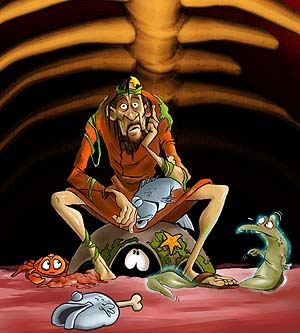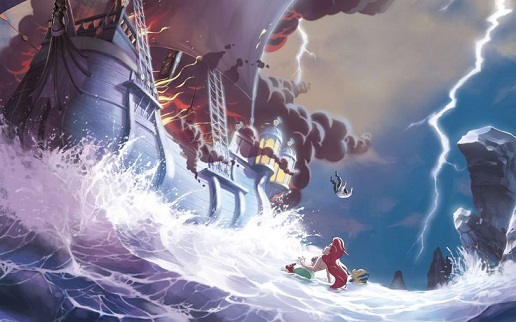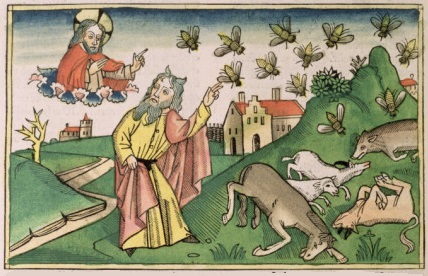 Those of you who are not Sunday-go-to-meetin’ people may have to excuse me for a moment. So might those of you who are, but who live it like a calling rather than wielding it like a cudgel.
Those of you who are not Sunday-go-to-meetin’ people may have to excuse me for a moment. So might those of you who are, but who live it like a calling rather than wielding it like a cudgel.
I am by no means a preacher of the gospel. But if the powers-that-be are going to sling Bible around in defense of stockpiling weapons and demeaning the weak and the weary, I don’t feel too guilty suggesting that parts of it actually promote enlightenment, children, and self-examination.
With that in mind, I’d like to talk about Jonah. Yes, the one who was swallowed by a fish.
While my personal theology includes a very real Jonah and a very large fish, you’re welcome to distance yourself from such orthodoxy and think of it as a parable or fable of some sort. Whether literal or figurative, it made it into the part of the Bible most evangelicals believe – “all of it.” That gives the story some validity either way – at least among those I wish would stop blaming Jesus for their own horrible political leadership.
Jonah, as the story goes, was given an assignment by God with a big ‘G’ (or Yahweh with an omni-sized ‘Y’, if you prefer). “Go to Nineveh and explain a few things so they won’t end up destroyed.”
It wasn’t a particularly vague command, or one of those “does He mean X or did He really mean Y?” situations. He’s not a Greek Oracle – Jonah’s God was stern and direct, striking people down for minor infractions and such. Jonah understood exactly what he expected was to do.
But he didn’t want to.
Why?

There are various explanations, but the most consistent and plausible is that he didn’t think much of Nineveh. It was going to be a lot of work to “straighten them out.” They were yucky, and did bad things, and weren’t raised properly.
He would presumably have been quite willing to go preach to a cleaner, nicer nation – one full of happy white home-schooled children or properly disciplined Methodists whose parents read to them when they were little. And maybe that was the kind of thing Jonah normally did before, or would do after, the events recorded in this tale – we don’t really know.
But Jonah didn’t like Ninevehians, and we can’t – in all fairness – entirely blame him. They’d made some poor choices and probably didn’t deserve his efforts towards their enlightenment.
So he runs.
Not a great move, given the whole ‘Omniscient God’ thing, but we don’t always do what we know is reasonable or right. Sometimes we’re slaves to our biases and fears.
Lesson one from Jonah’s little escapade is that even when we have some pretty good reasons to do the wrong thing, it’s still the wrong thing.
Lesson two is that when we neglect our professional responsibilities, we’re not the only ones affected. While Jonah dozes deep in the bowels of his getaway ship, everyone else on board is damn near killed by the resulting tempest.
 Even after they figure out the problem is Jonah and toss him over, that doesn’t bring back the cargo they lost trying to ride out the storm or the contents of their stomachs recently shared with the sea. Jonah left behind a mess, personally and fiscally.
Even after they figure out the problem is Jonah and toss him over, that doesn’t bring back the cargo they lost trying to ride out the storm or the contents of their stomachs recently shared with the sea. Jonah left behind a mess, personally and fiscally.
Next comes the fish part. Jonah repents – at least temporarily – and is vomited onto land. This is a nice little grave’n’rebirth image, albeit smellier than most. Lesson three, if we’re to keep it temporal, is along the lines of “sometimes you need a good kick in the pants to do the right thing.”
What I’m most interested in, though, comes after Jonah’s rebirth on the beach.
God calls again and Jonah goes to Nineveh this time. It took several days to travel through the whole city, and while the story doesn’t record many specifics, it seems reasonable to think he spent much of that time explaining how things truly worked to those he encountered. Whether he was teaching or exhorting or complaining about life inside a fish, he said enough to get the king’s attention and the whole city ended up in sackcloth and ashes, repenting of their evil ways.
I can’t prove, Biblically, that he taught and challenged them during these three days. It’s entirely possible he just kinda walked around and maybe hung out at Applebee’s chatting up the wait staff over the weird drink options they keep pushing.
But it makes more sense to imagine him – however begrudgingly – sharing the truth as he understood it and telling them stories of past nations in comparable situations. Once it started to click, it caught on.
 Lesson Four, then, is that sometimes yucky people are the hungriest for attention and enlightenment – for someone to care enough to challenge them to reconsider their ways. Lesson Five is that sometimes you don’t need to win everyone to be effective – you have to win enough to change the momentum of the whole.
Lesson Four, then, is that sometimes yucky people are the hungriest for attention and enlightenment – for someone to care enough to challenge them to reconsider their ways. Lesson Five is that sometimes you don’t need to win everyone to be effective – you have to win enough to change the momentum of the whole.
The part we often forget – because it’s awkward and hard to explain – is that the story ends with Jonah annoyed and pouting because his teaching was effective. He hates that he devoted his energy and resources to helping “those” people, who ended up better off as a result.
It’s hard to spin this positively in the children’s books devoted to this otherwise nifty yarn. It’s kind of a jerk way to behave.
Jonah finds himself a spot outside of Nineveh where he can keep an eye on the city from a distance and see if maybe they’ll be destroyed after all. He tends to his own comfort, and God helps him out by miracle-growing a big leafy plant overhead to provide a little extra shade.

Prior to his visit, he could at least have argued that Nineveh deserved whatever they got. They’d made bad choices and with those often come natural consequences.
Now, however, Nineveh was on a much better track. They were doing what cities needed to do to stay in good standing with the Big Guy, and presumably peace and prosperity were coming their way (that’s how things tended to work in the Old Testament). Now any illusion that Jonah’s mindset was exclusively about behavior or choices is dispelled.
He just doesn’t like these people. At all. He kinda wishes they’d just die, whether they’re doing everything he could possibly ask or not. Sure, his God loves them, blah blah blah, but why should he have to endure them?
Lesson Six, appropriately enough, is that people – even God’s chosen messengers – can be bitter and small and ugly and wrong. Some of it’s culture; much of it’s choice.
Lesson Seven is from Jonah’s God, who took away the tree and upped the discomfort level for Mr. Sulky. “You’re mad about losing some of the perks and comforts you never really built or earned to begin with – temporal things of limited value. I’m more concerned about actual people – lots of them – who don’t even know how much they need education and understanding.”
And the story ends abruptly.
It’s possible Jonah learned a thing or two about empathy and continued his calling with a better attitude and a changed heart. Then again, maybe he ran for office and ended up peddling bad education policy across Oklahoma – forever fleeing Nineveh without regard for the consequences.
RELATED POST: The Social Contract (aka “Haman’s Gallows”)
RELATED POST: Um… There Are These Kids We Call ‘Students’?

 No one knows history anymore.
No one knows history anymore. Complete freedom is chaos, and extremely limiting, when everyone has it. Nothing lasting can be accomplished because we’re all too… free – and selfish in our freedom.
Complete freedom is chaos, and extremely limiting, when everyone has it. Nothing lasting can be accomplished because we’re all too… free – and selfish in our freedom. For those of you who didn’t go to Sunday School (tsk tsk!), the Old Testament is about taking care of US – the CHOSEN people, the GOOD people. It’s rather harsh for most everyone else – the OTHER, the UNCLEAN.
For those of you who didn’t go to Sunday School (tsk tsk!), the Old Testament is about taking care of US – the CHOSEN people, the GOOD people. It’s rather harsh for most everyone else – the OTHER, the UNCLEAN. Do we want to settle for compromises and logistics, tweaking via Amendment or reinterpretation from time to time, as we’ve done with our Constitution and (to a less-admitted extent) our scriptures; or do we want to strive for the ideals that are the ENTIRE REASON for either document to exist in the first place?
Do we want to settle for compromises and logistics, tweaking via Amendment or reinterpretation from time to time, as we’ve done with our Constitution and (to a less-admitted extent) our scriptures; or do we want to strive for the ideals that are the ENTIRE REASON for either document to exist in the first place? Except we’re not doing it for them – we never were. Ultimately, it helps each of us when we find a place for all of us. On the whole, it’s good for each of us when we learn to value all of us.
Except we’re not doing it for them – we never were. Ultimately, it helps each of us when we find a place for all of us. On the whole, it’s good for each of us when we learn to value all of us.